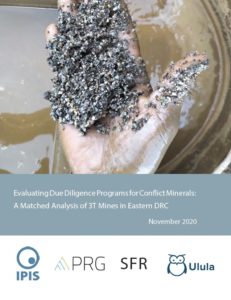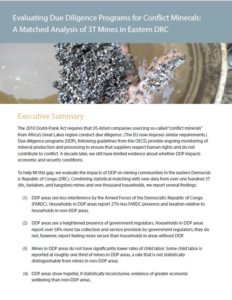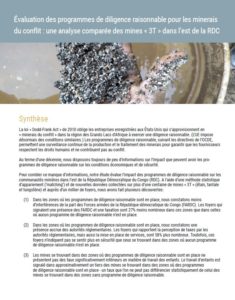Due Diligence
Due diligence
Due diligence
We partnered with IPIS, SFR, and Ulula to evaluate the impact of due diligence programs on security and economic wellbeing of communities surrounding 3T mines in eastern Congo.
Motivation
The 2010 Dodd-Frank Act requires that US-listed companies sourcing so-called “conflict minerals” from Africa’s Great Lakes region conduct due diligence. (The EU now imposes similar requirements.) Due diligence programs (DDP), following guidelines from the OECD, provide ongoing monitoring of mineral production and processing to ensure that suppliers respect human rights and do not contribute to conflict. A decade later, we still have limited evidence about whether DDP impacts economic and security conditions.
To help fill this gap, we evaluate the impacts of DDP on mining communities in the eastern Democratic Republic of Congo (DRC). Combining statistical matching with new data from over one hundred 3T (tin, tantalum, and tungsten) mines and one thousand households, we report several findings.
Results
Photo credit: Timo Makori
(1) DDP areas see less interference by the Armed Forces of the Democratic Republic of Congo (FARDC). Households in DDP areas report 27% less FARDC presence and taxation relative to households in non-DDP areas.
(2) DDP areas see a heightened presence of government regulators. Households in DDP areas report over 58% more tax collection and service provision by government regulators; they do not, however, report feeling more secure than households in areas without DDP.
(3) Mines in DDP areas do not have significantly lower rates of child labor. Some child labor is reported at roughly one third of mines in DDP areas, a rate that is not statistically distinguishable from mines in non-DDP areas.
(4) DDP areas show hopeful, if statistically inconclusive, evidence of greater economic wellbeing than non-DDP areas.
Conclusion
How one regards these impacts depends on the benchmark for success. We detect meaningful progress toward several goals in DDP areas; yet, we also find that DDP does not eliminate all of the harms associated with 3T mining in the eastern DRC. We uncover reasons to applaud these efforts, but also room for improvement, particularly with respect to labor practices and miners’ livelihoods.
Our results rely on the analysis of original survey data collected from 104 mine sites and 1,054 households in nearby villages in South Kivu and Maniema at the end of 2019. We employ a matching technique that compares mining areas with and without DDP that have similar geographies, histories of conflict, and development trajectories.


